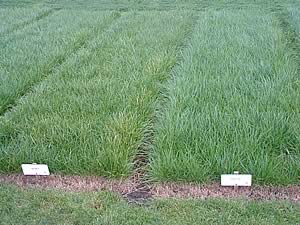 |
|||||||||
|
|||||||||||||||||||
|
|
Barenbrug Varieties Show Strong Resistance to Dreschlera Leaf Spot 07/01/09 The combination of last summer’s warm and wet conditions led to a dramatic increase in the occurrence of dreschlera leaf spot. However, specialist grass seed breeder Barenbrug believes farmers can avoid the problems caused by this wet-weather disease, which affects yield as well as the palatability of grazing swards, by sowing leys featuring its resistant grass varieties.
Barenbrug’s breeding partnership with AFBI (Agri-Food and Biosciences Institute) in Northern Ireland has been responsible for breeding varieties suited to wetter climates. AFBI plant breeder David Johnson confirms that the fungal foliar disease was seen the length and breadth of the UK last summer. “Dreschlera leaf spot has been widely reported on perennial ryegrass swards throughout the UK in the last two years, particularly in 2008 when it has been observed from as far south as Cornwall to the north east of Scotland,” he comments. “The warm, wet conditions have been perfect for the development of this disease and in some cases swards have been severely affected, showing typical symptoms of black speckles and yellowed leaf blade. In severe cases, the leaf tissue is completely killed.” Moreover, Barenbrug says that some farmers have compounded the problem by not applying fertiliser to grass in late summer, so that growth slows down and leaves become older, and hence there’s more time for the disease to take hold. Varieties are selected in Northern Ireland’s characteristically wet conditions, with many showing an inherently strong resistance to dreschlera, as David explains: “Perennial ryegrass varieties show large differences in their susceptibility to leaf spot, ranging from those that are highly resistant to those severely affected by the disease. Resistance to leaf spot is an important breeding characteristic for our breeding programmes and many of the varieties used in Barenbrug mixtures have a high resistance to this disease.” Trials at NIAB (National Institute of Agricultural Botany) in Cambridge have also confirmed the capability of Barenbrug varieties to withstand the disease, with plots showing no disease incidence alongside varieties that have suffered considerably. To further reduce the risk of disease, Barenbrug also recommends overseeding existing swards with its Ensign White Clover mixture in order to fix nitrogen into the soil for a healthier sward that will keep growing through the autumn and winter months. Full details of Barenbrug’s agricultural grass seed mixtures are available in its new Forage Catalogue 2009. Call 01359 272000 or email info@baruk.co.uk to request your free copy.
|
||||||||||||||||||

|
|
||||||||||||||||||
| home | agri-services | pedigree
pen | news | dairy | beef | machinery BPS | property | organisations | site map |
|||||||||||||||||||


